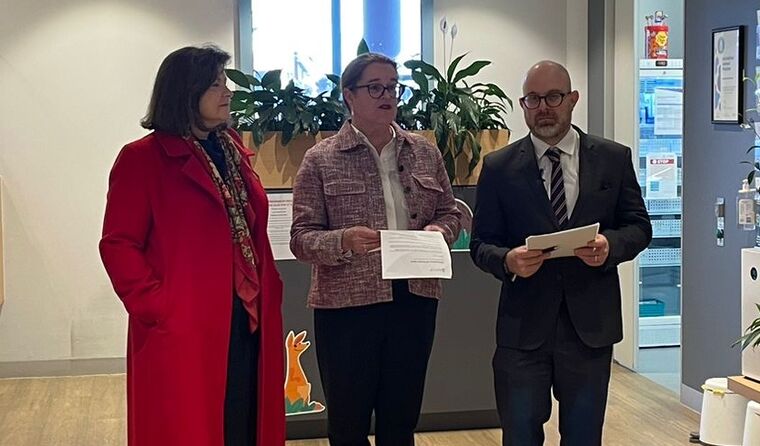News
GPs and politicians ‘need to be working together’
One of the RACGP GP Advocate Network’s newest members says being proactive to ‘protect what GPs do best’ has many rewards.
 ‘Tapping into our knowledge will assist politicians in forming their policies,’ says Dr Madeleine Smith, pictured at her Melbourne clinic. (Image: supplied).
‘Tapping into our knowledge will assist politicians in forming their policies,’ says Dr Madeleine Smith, pictured at her Melbourne clinic. (Image: supplied).
When Federal Assistant Health and Aged Care Minister Ged Kearney requested a general practice to host the launch of the latest edition of the RACGP’s Red Book in June, Dr Madeleine Smith jumped at the chance.
‘It was a wonderful opportunity for my clinic to host, and to liaise directly with government and facilitate discussion around primary care prevention,’ Dr Smith told newsGP.
Inspired by the experience, Dr Smith has now signed up to the RACGP’s GP Advocate Network as a representative for the Federal Electorate of Cooper in Victoria, the same one represented by Minister Kearney.
‘I believe GPs are excellent at advocating for their patients and communities, but when it comes to the survival of our profession, we are unsure where to start and how to go about things,’ she said,
‘There seems to be no clear line of communication between us and the policymakers in either direction.
‘The GP advocacy network offers support, navigation, and coordination in advocating for general practice.’
Much like the other 47 GP advocates across Australia, Dr Smith says it is vital decisionmakers hear directly from GPs because they offer a unique perspective.
‘Tapping into our knowledge will assist politicians in forming their policies,’ she said.
‘A lot of our work is unseen and poorly understood. Members of Parliament have expressed that they don’t hear from GPs nearly as much as other professions, such as pharmacists and nurses, who they have described as “knocking down their doors every week”.
‘GPs and governments have the unique shared common goal of wanting a healthy population, decreased disease burden and prevention of disease while not passing the cost onto the population.
‘We need to be working together.’
 Minister Ged Kearney launching the Red Book in June at Dr Smith’s Melbourne clinic, Preston Family Medical. (Image: supplied).
Minister Ged Kearney launching the Red Book in June at Dr Smith’s Melbourne clinic, Preston Family Medical. (Image: supplied).
Dr Smith has a long list of advocacy priorities she believes the Federal Government needs to action.
She pointed to the Treasury’s 2023 Intergenerational Report which projected Government spending up to 2062–63 and found that health, aged care and the NDIS are the three fastest-growing areas of spending.
Meanwhile, other areas of Commonwealth spending, such as income support, aged pensions, and education, are expected to fall.
‘GPs are already at the forefront and lynchpin of these growing sectors,’ Dr Smith said.
‘Any good government or policymaker needs to be engaging with GPs. The Government must focus on preventive health to reduce costs and health burdens.
‘Clear and adequate remuneration for preventive health work such as chronic disease management plans, targeted health assessment for at-risk populations and reinstating item numbers for smoking and vaping cessation counselling is critical.’
Valuing the importance of mental health intervention by GPs in reducing future physical health and socioeconomic problems is also essential, Dr Smith says, as the RACGP stands by ongoing calls to increase Medicare rebates for patients’ mental health care GP consults.
While GPs have an ‘excellent understanding’ of the profession’s needs and the level of support that is needed, Dr Smith said they have not been given the platform to communicate these needs to policymakers.
But the GP Advocate Network provides that platform.
‘If we don’t self-advocate, we risk being excluded from the table and continue to see policy that directly affects our day-to-day practice made without our input,’ she said.
‘I would definitely encourage other GPs to get involved in the GP Advocate Network. It’s nice to feel like you are doing something proactive to protect what GPs do best.’
The RACGP now has close to 50 trained advocates working across Australia on its growing GP Advocate Network, each providing a voice on local community health issues within their own electorate.
More information on how to join the GP Advocate Network is available on the RACGP website, and interested members can also email gpadvocate@racgp.org.au.
Log in below to join the conversation.
advocacy general practice reform GP Advocate Network policymakers 'RACGP Red Book
newsGP weekly poll
Which of the following areas are you more likely to discuss during a routine consultation?